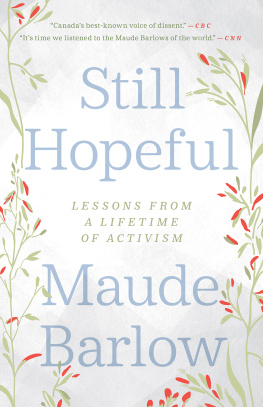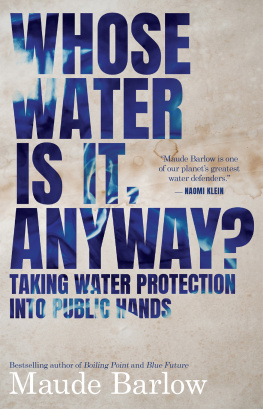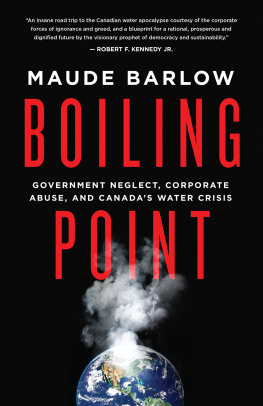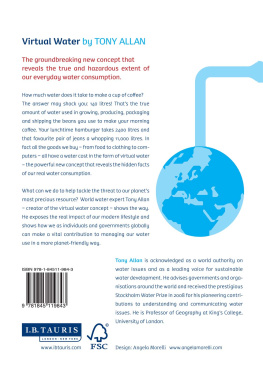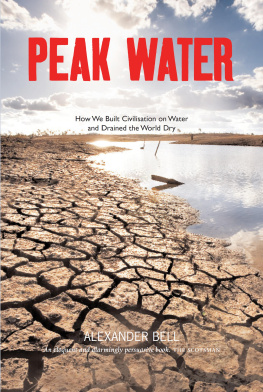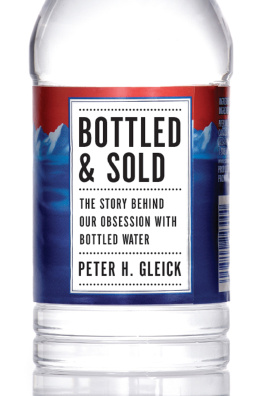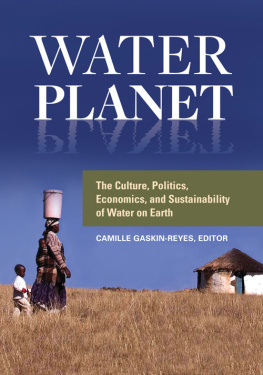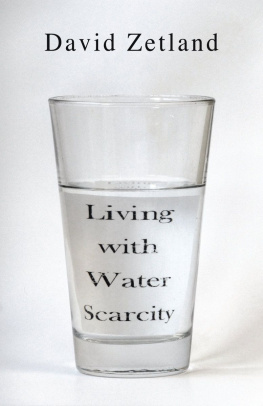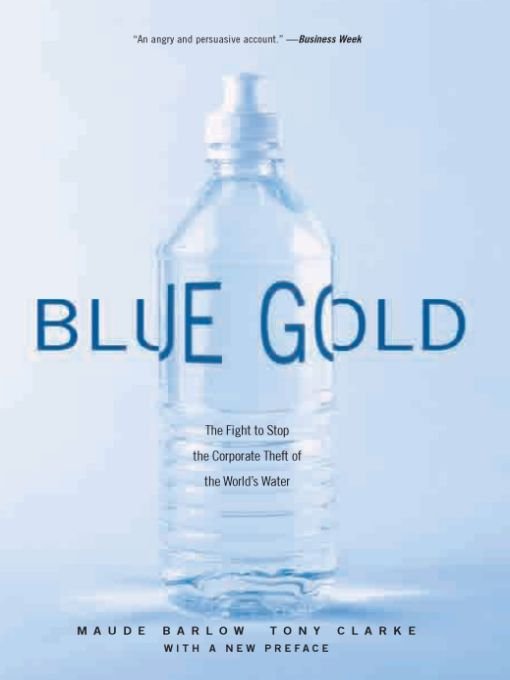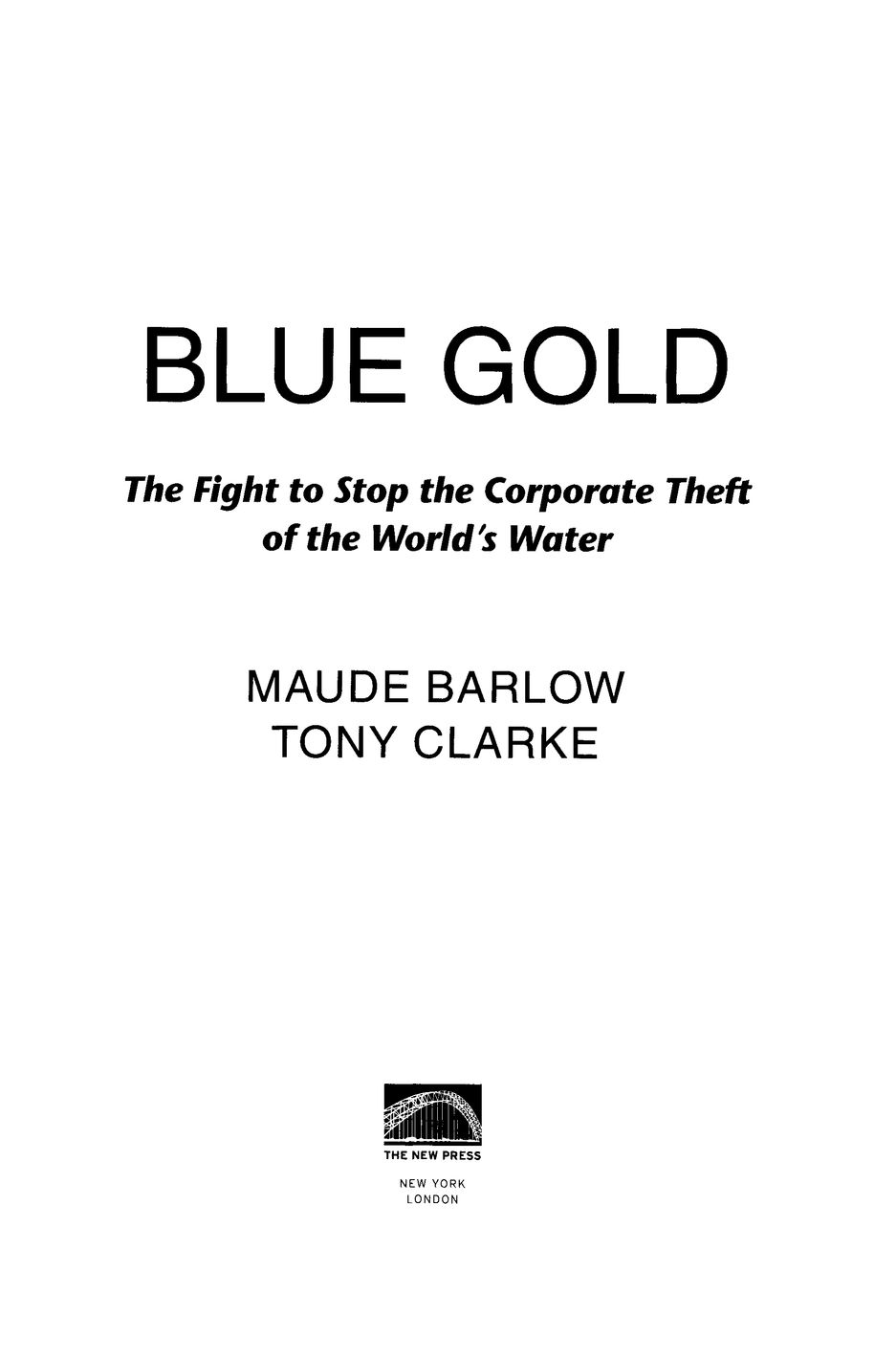Table of Contents
For KIMY PERNIA DOMICO,
tireless fighter for Indigenous rights to water,
who was disappeared by Colombian paramilitary forces
on June 2, 2001. You are dearly missed.
PREFACE
Since the original publication of Blue Gold (now available in twenty-seven countries), debate about the worlds dwindling water supply has intensified.
The reach of the big three water corporations Suez-ONDEO, Vivendi-Veolia of France, and RWE-Thames Water of Germany has grown. Suez and Vivendi now control over 70 percent of the existing water service market worldwide and their revenue growth has kept apace. Vivendi earned just US$5 billion a decade ago in its water-related revenues; by 2002 that had increased to over US$12 billion. All three are ranked among the wealthiest hundred corporations in the world with combined annual revenues in 2002 of almost US$160 billion and they are growing at 10 percent a year thereby outpacing the economies of many of the countries in which they operate. They also employ more staff than most governments: Vivendi employs 295,000 worldwide; Suez employs 173,000.
At the same time, they are in trouble. Fierce local resistance in both rich and poor countries is forcing these companies to abandon their operations, or seek guaranteed funding from the World Bank and local governments to cover the costs of their failures. The World Bank has tripled the amount of funding available to poor countries for water privatization schemes, and a 2003 study by the International Consortium of Investigative Journalists found that the majority of World Bank loans for water in the last five years have required the conversion of public systems to private as a condition for the transaction.
Similarly, the big bottled-water industry still largely unregulated is growing at a furious pace. The industry now rakes in 46 billion dollars worth of profit every year, up from $22 billion just three years ago. On average, every European now consumes over one hundred liters of water annually and pays 1,100 times more than he or she would for tap water. A massive amount of plastic 1.5 million tons a year is now used to supply this industry, and most of it ends up in landfill and waterways where it leaks toxins into the ground and water.
However, the most important development has been the explosion of grassroots opposition to the private control of the worlds water. In communities all over the world, local groups have sprung up to fight the privatization of municipal water services, halt the mining of groundwater by the big water-bottling companies, and stop the commercial export of bulk water from their territories.
In Africa, where lack of access to clean water kills millions of people every year, many community groups have formed to wrest back control of local water sources. In Ghana, Mozambique, Senegal, and Zambia, civil society groups are fighting World Bank structural adjustment programs that include the privatization of water services. In South Africa, where water is guaranteed as a fundamental human right in the constitution, the Anti-Privatization Forum (APF), a huge township-based grassroots movement, works closely with the South Africa Municipal Workers Union (SAMWU) to fight the practice of water metering.
All over Asia, a fierce ballet is shaping up around the privatization of water, with a surprising number of victories. Suez subsidiary Maynilad Water is abandoning its concession in Manila, the Philippines, in the wake of public backlash over heavy price increases. In Jakarta, Indonesia, strong protests by environmentalists and students are keeping up the pressure on the government over a contract made with Suez under the old Suharto regime to run that citys water system. In India, local groups and public sector workers are fighting the proposed privatization of New Delhis water system and local villagers in Plachimada, Ker-ala, have successfully sought a moratorium on water takings by the Hindustan Coca-Cola Company after two years of fierce protest.
In Latin America, there are community groups fighting for access to water or against privatization in almost every country. Brazil is considering taking back all private water concessions into public hands. Friends of the Earth are leading a national plebiscite in Uruguay for a referendum on water privatization. Public opposition to Suez in Buenos Aries came close to shutting the company down altogether in the summer of 2003. That same summer, forty-seven grassroots organizations from sixteen countries of the Americas met in San Salvador where they launched a new movement called RED VIDA and issued the San Salvador Statement for the Defence and the Right to Water.
In North America, opposition to water privatization has turned back or limited major privatization projects in New Orleans, Atlanta, Lexington, Chattanooga, Charleston, Toronto, and Vancouver. Citizens groups forced Perrier to abandon a huge water takings project in Wisconsin, and similar fights are now taking place in New Hampshire and Michigan. In 2003, environmental groups turned back a proposal by Cadiz, Californias largest farming company, to sell aquifer water under the Mojave Desert to Los Angeles for profit, and citizens groups stopped a plan by another private company, Alaska Water Exports, to export massive amounts of water from the Gualala and Albion Rivers to San Diego using giant inflatable bags.
In Europe, ATTAC, Public Services International, Corporate Europe Observatory, the Global Water Contract, and Friends of the Earth International are challenging the big water companies in their own backyard. Because the European Union is aggressively promoting its companies interests around the world through the WTOs General Agreement on Trade in Services, these groups and others are campaigning hard against this pernicious agreement. They are also providing excellent research on the companies for use by local activists around the world.
These grassroots groups came together at the Third World Water Forum in Kyoto, Japan, in March 2003. There, the World Water Council held the largest gathering ever on the issue of the future of the worlds water. Under the common project Water Is Life, hundreds of activists attended every session, held press conferences, staged protests, and made it clear that the pro-privatization consensus desired and promised by the organizers was not going to happen. In fact, on the Web site of the WWC, the final report clearly states that on the issues of the privatization of water and the role of corporations in the future of water, there was deep division at the Forum a remarkable achievement for the civil society activists who attended.
Then, in January 2004, activists from sixty-three countries met in New Delhi to launch a new international network to fight for water rights for all. The Peoples World Water Movement was launched with unanimous support for a plan of action that includes: a support network for groups fighting for water rights around the world, a binding UN Convention on Water as a Human Right, coordinated campaigns against the WTO and the World Bank, and more targeted campaigns against Coca-Cola and Suez chosen because they are so flagrantly destructive of local communities and environments and because they are already the target of many existing on-the-ground struggles.
Welcome to the world of Blue Gold and the most important struggle of our time.


